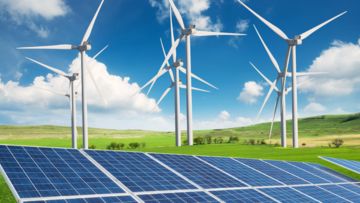Thematic Investing

Acting now for the Climate’s Future
March 2023 | 3 minute read | Marketing Communication
We believe it’s the steps we take that are important. A small move forward might be for a household to recycle more or use less water and disposable plastic. A bigger one could be to switch to renewable energy or start driving an electric car.
| "We need climate action because the world is suffering an environmental emergency and anything we do to help can make a difference."
|
"Not only will we see cities destroyed and populations uprooted because of floods, droughts and shortages of food and water, but over time whole species of animals and plants will become extinct." |
"By investing in companies that generate positive environmental benefits, while also earning a return, together we can seek to make a difference and help to counteract the impact of climate change." |
Climate crisis
There are larger steps too, such as helping to restore some of the world’s lost forests – it’s possible to pay for as little as one planted tree – or to stop using pesticides on gardens and fields and put down fertilisers instead. Each of these things matters and every one of them helps to preserve our planet and to slow down the effects of global warming. This is climate action in practice.
Why do we need climate action? Well, we believe it’s necessary because the world is suffering an environmental emergency, and anything we do to help can make a difference. Humankind’s activities, including the persistent burning of fossil fuels such as coal and oil, have led to dangerous levels of carbon dioxide in the atmosphere.
Heat trapped by this and other ‘greenhouse gases’ has helped to warm the world at an alarming rate and, in turn, has made dramatic changes to our climate[1]. Roughly half of the carbon dioxide (CO2) emissions between 1750 and 2011 occurred during the last 40 years of the period[1], according to the Intergovernmental Panel on Climate Change. The consequence of our surging emissions means that, during the past year alone, we’ve seen flash floods and forest fires, the surface of the Earth reach near record average temperatures and sea levels hit an all-time high.
Failing to act now means the situation will only get worse. Not only will we see cities destroyed and populations uprooted because of floods, droughts and shortages of food and water supplies, but over time whole species of animals and plants will become extinct. The legacy we’d leave for future generations would be one of economic uncertainty and potential societal fracture.

Helping hands
Fortunately, we are not alone. In 2015, nearly 200 world leaders signed the Paris Agreement, committing to try to limit the global increase in temperature to 1.5 degrees Celsius against pre-industrial levels.
They also agreed to provide financial support to those that need it in the transition to a zero-carbon global economy by 2050, or sooner if possible. These commitments were affirmed at the most recent COP26 Climate Summit in Glasgow, along with other pledges, including on coal, electric vehicles, deforestation and methane emissions.

In an ideal world, if we could flick a switch and stop all of our damaging activities overnight, then we would. However, making the changes in stages – or ‘transitioning’ – means we can try to help countries and communities whose livelihoods would otherwise be in jeopardy make the necessary adjustments for a sustainable future.
There are other frameworks to guide us, such as the UN’s 17 Sustainable Development Goals. These are a detailed set of objectives aimed at ending poverty, protecting the planet and improving the lives and prospect for everyone that were adopted by all UN member states in 2015. They include to “take urgent action to combat climate change and its impacts”; in other words, climate action.
Investing in change
We can all play a part in combating climate change. For individuals, it could be consuming less waste and for businesses it could be moving to become carbon neutral. For investors, it may involve backing companies with sustainable strategies and encouraging those that are lagging behind to do more. If we all act, together, we have a chance to make a real difference and preserve our precious planet.
Sources
Amundi Asset Management as at March 2022. [1] Intergovernmental Panel on Climate Change 2014
Important Information
Unless otherwise stated, all information contained in this document is from Amundi Asset Management S.A.S. and is as of March 2023. Diversification does not guarantee a profit or protect against a loss. The views expressed regarding market and economic trends are those of the author and not necessarily Amundi Asset Management S.A.S. and are subject to change at any time based on market and other conditions, and there can be no assurance that countries, markets or sectors will perform as expected. These views should not be relied upon as investment advice, a security recommendation, or as an indication of trading for any Amundi product. This material does not constitute an offer or solicitation to buy or sell any security, fund units or services. Investment involves risks, including market, political, liquidity and currency risks. Past performance is not a guarantee or indicative of future results.
Date of first use: March 2022
Doc ID: 2029149
You might be interested in

Renewable energy: power to conserve the earth
You’ve probably heard it called lots of different names: clean energy, green energy, sustainable or alternative energy. It’s most often and most clearly referred to as renewable energy; but what is it?

Video: Climate Action
Nobody can turn back time. But everyone can shape the future. Question consumer decisions, reduce your own CO2 footprint or invest sustainably.